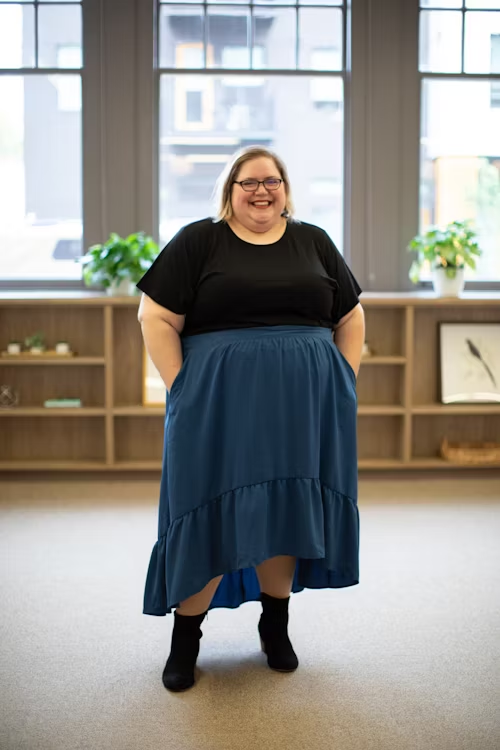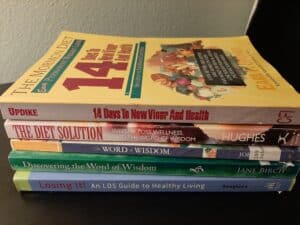This is the third in a series of guest posts about being fat and female in The Church of Jesus Christ of Latter-day Saints. Please consider contributing your own post by emailing [email protected].
By Anonymous
I grew up a mid-sized daughter of a sometimes-overweight and always fatphobic mom who, prior to having children, was skinny as a rail. I was also raised at the peak of low-fat diet culture, and when I entered adolescence and moved into young adulthood, Jessica Simpson’s size 4 body was criticized as fat in her high-waisted mom jeans.
Sometime when I was a child, probably around fifth or sixth grade, my mom received an anonymous flier from a member of the ward advertising joining a weight loss group in the Relief Society. At this point she had had four children in eight years and would go on to have one more. It was accompanied with a simpering hand-written note that assured her there was hope for her and that it really was important “for her health” to lose the baby weight. Humiliated, my mom’s response was to cry and go on a crash diet.
Around the same time, my mom’s parents also started commenting on her weight, and her father specifically called her one day not to catch up, but to tell her he’d been so worried about her health because of how fat she’d gotten and how important it was–for her physical health and the health of her marriage–to go back to being skinny. In both my family and the church overall, I recall having discussions that emphasized having a larger body was a sign of not taking seriously the spirit of the Word of Wisdom. The dietary and lifestyle counsel given in the Doctrine & Covenants was frequently cited in Sunday school and seminary classes I attended, suggesting slothfulness and gluttony were offensive to the spirit and a sign of personal weakness. I had more than one mission companion who put weight on and confirm this toxic thought; they would try to “pray the fat away” before returning home. I’m not entirely sure why such a vein of self-hatred ran through my family members or fellow church members. In retrospect, it’s tempting to say this was an outside cultural influence that was noxiously poisoning LDS culture’s conception of the body because of the spiritual rhetoric that was often invoked in these lessons. But it’s probably more complicated than that.
Even if I wasn’t fully aware of the total rudeness and lack of boundaries around how my mother was being treated over her change in appearance, I was hyper aware of her poor body image and yes, it certainly rubbed off on me. When I’d complain that I thought I was fat, she’d roll her eyes and say yeah, she wished she was as fat as me. But of course I thought I was fat! From about age twelve onward (I’m 38 now) I’ve consistently struggled to like how I look and I grew up listening to other young women moaning about how they didn’t want to turn into fat, dumpy housewives once they had children. We all picked up on the social unacceptability of mom-bod and swore that wouldn’t be us. We didn’t want to be the mumu-wearing women with Relief Society arm (yes, we called it that) that would sway back and forth while we led the music. We wouldn’t be fat Jessica Simpson in her mom jeans.
I can see now that my self-perception of my image and discomfort with the number on the scale is the result of a complex blend of the culture I was raised in–both secular and religious–and because I had a mom who was always trying to cut calories, always trying to eat less. Always on a diet. At one point, she dropped sixty pounds on Weight Watchers and I know she received endless validation for it. But none of that was enough for her to feel good about her size–young or old, skinny or fat, I don’t think my mom ever felt like she could really embrace her appearance for what it is; with woman to woman comparison so common to LDS culture, I don’t think she noticed how unhealthy it is to feel miserable about your appearance. It’s just…part of being a woman. Something about it says that every woman hates how she looks, and should hate how she looks, just a tiny bit. If she doesn’t, she’s probably vain and suffers from too much pride. I’m sure my mom felt like she wasn’t beautiful enough compared to other women in the ward who were more conventionally pretty or skinnier, but that belief was likely an unconscious one because of how normal it was to stigmatize larger bodies inside and outside of church.
And for myself, I’ve had to actively try to deprogram from that mentality as I’ve aged and had children of my own. Thank goodness I haven’t received my own anonymous fat-shaming flier in the mail, and thank goodness we’ve (hopefully?) moved past that as a church. But it’s still not easy. I’m still pining after a different body and I often hate how I look in 90% of my clothes four years after having kids. On really dark days, I tell myself that my husband would want to have more sex with me if I was skinnier, and that maybe some of his seeming lack of interest stems from me not living up to an idealized, ultra-feminine, agreeable, beautiful image of a wife that’s held in such high esteem in LDS culture. Sometimes at night, after days like that, I will lay in bed in the dark and deliberately rest my hand on my inner thigh or the bulge of my hip and say in my head, “This is yours and it is good. Your body is a good body.” I tell my kids the same thing when they show me their bellies and I tell them that God loves his children so much, he gives them bodies that enjoy good food, scooter around in the sun, cuddle up on the couch, and come in all different shapes and sizes, even if their own mom doesn’t always experience that physicality as a blessing and on some days, it’s a downright curse. At least I know better than to fat shame myself in front of my children the way my mom did around me, and that’s a start in changing something, right? .
Anonymous teaches English and is a mom to two kids. She frequently lurks the Bloggernacle and occasionally pops in to leave her two cents in the comment section.
Featured image from unsplash.com and AllGo – An App For Plus Size People






4 Responses
Thank you so much for sharing your story. I relate in a lot of ways, particularly about the fat-shaming culture that was rampant when I was growing up in the 80s and 90s. Since my earliest days, I can remember a lot of women my mom’s age talk about weight, praising women who are slim and critiquing people who carry extra pounds. I know I was and still am affected by this focus on women’s bodies and their weight. There’s not a day that goes by when I don’t worry about calories or feel bad for eating something. Like you, I have vowed to myself to never mention weight to my kids — my own or their own. I think I’ve succeeded so far. Maybe our generation can undo some of the damage for the next generation.
I relate so strongly to your experience (39, low fat calorie diet fads of the 90s, WW, plus size parent with own weight and eating issues, Jessica Simpson era) and just want to hug you and acknowledge that we were so wounded at that time.
Like you, I have had to do a lot of active deconstruction work, but the biggest challenge is loving/neutralizing my body while those attacks of the thinness pedestal occur. I’ll catch myself in a mirror or a window and just wish I looked different. I’ll listen to everyone (and it really does feel like everyone right now) talk about who’s on Wegovy/Ozempic and their new diet/exercise regimen and how fat they feel and it’s this constant onslaught of “thin is best” when I’m trying so hard to say “all bodies are the best.”
At the best of times, I know my body is strong. It’s done everything I’ve ever asked it to do, including carrying twins and giving birth. I know that I am desirable to my partner. I know that my movement and eating habits are joyful parts of a full life rather than a sacrifice to the gods of thinness. I am so proud of the work I’ve done. My mental health and, incidentally, physical well-being, are the best they’ve ever been, no matter what the scale says.
Still, there’s the pining for thinness.
It always comes back to being thin somehow.
Why DON’T we typically talk about how focusing on weight can lead to so many disorders? Thanks for sharing your experiences and insights!
I remember having sister missionaries over at our house and I made them macaroni and cheese and they only took the tiniest amount and were encouraging each other to eat as little as possible. They saw me nursing my 7th month old and said, you’re not going to nurse past a year, because that’s really gross. They then went into some lectures about how women should act and I found it really off-putting. I found that there was an New Era article (it was written by a sister to the church, I can’t remember the name, something about “to the lady missionaries”–about early 1970s, and it has since been denounced by the church via product of it’s time label) that had a diet plan in it. I’m struggling with weight for health reasons (not image reasons) so even though I expressed shock when I found the controversial article, I was glad to know why the sisters were behaving this way. But then decided to put the diet to the test–yeah it slowed my metabolism and I gained weight. It must have induced stress among the young women who were now learning to diet behind their parents back. The article had other problematic issues like trying to tell girls they couldn’t change their minds about missions once they were on them, and trying to make the girls feel like they had it easy and that they owed something to the elders (like spending their p-day taking on all the elders chores, cheerleading for them as they played sports, making them cookies, and asking for their advice on how to spend their day)–my husband isn’t exactly a feminist approved guy, but even was very uncomfortable at the thought of sisters doing that. He got mad when zone leaders on his mission wouldn’t let the sisters have dinner appointments because they claimed they needed it more.
This was part of a long line of experiences as I was trying to understand what it would be like to send a child on a mission: I watched the documentary that people were sharing about sister missionary weight loss culture, and later saw an article about the high rates of mission-induced infertility that the US government documented, and the lower level of college degrees among RSMs, and the burnout that sisters experience, and the huge amount that come home and are told to do all of these things to deconstruct, and are assigned someone to watch them, and even are given limited temple recommends so they can check up on their activity, and counseled to not tell anyone about their experience–and they just up and leave the church at high rates after the mission. I’m very scared, I kept being told growing up that missions make you oh-so-righteous, and yet that’s not what’s going on. Then they are buttered up after their missions through the My Plan program and told they are so much better than everyone else, and then leaders are confused when they say, well in that case I’ll only marry a fellow returned missionary. A really good friend of mine is a service missionary and she has such a pep in her step doing all of her dream internships, like playing with horses, and getting to call them a mission. We have such good conversations together, and I’ve even seen her alone with the male service missionary in our ward flirting–she told me that it’s not encouraged, but things are a little more flexible with them. However when I saw her out tracting with the proselyting missionaries as part of the new program started this year I was shocked at the stark contrast. They seemed so tired–I can’t believe how much they have to exercise. I talked with my service missionary friend about things and she seemed so normal, similar to elders who don’t take things too seriously and try to have a little fun–I never see this with regular sister missionaries because of all the pressure they put on themselves, especially the weight thing. The other sisters were huffed at her for not focusing on the gospel enough, although I guess that’s better than the conversations the sisters in my first paragraph were trying to focus on (it still gave me flashbacks of the time I tried to go on splits as a young woman only to be yelled at for not being pushy and trying to make friends–I never served a mission, and I’m glad because hypocrisy at BYU and being run down as a mom was traumatic enough, I couldn’t imagine experiencing both full time and not having a single convert like my husband which is the only thing about being a member that really bugs him, all of the propaganda around missions). So after they gave me the manditory scripture reading, I asked my friend, so are they treating you alright, I keep hearing that when service missionaries go on splits they get treated like second class missionaries. My service missionary friend in her enjoyable real voice, “Oh I’ve definitely heard of that happening”–and the other sisters tyring to contradict her in their soft, ephereal conference center voices saying that it’s not possible for that to happen because of their sacred calling. I’m so grateful my friend is on a service mission, I can’t imagine what pressure she’d be subject to if she had to proselyte full-time.